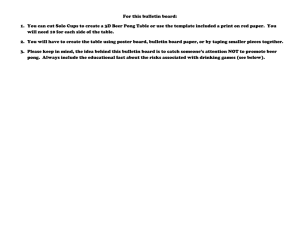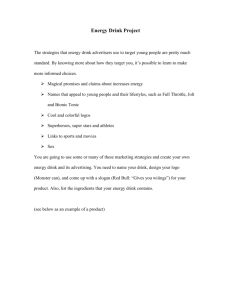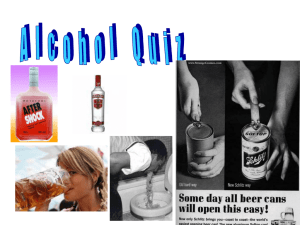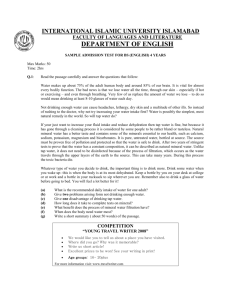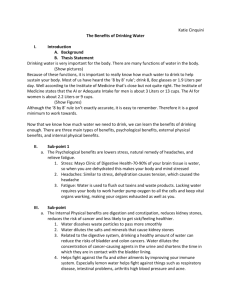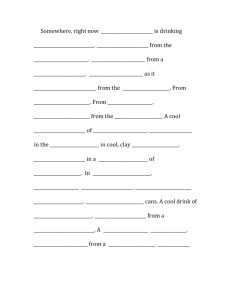Moderation: Deciding If t This is a Goal For Me
advertisement
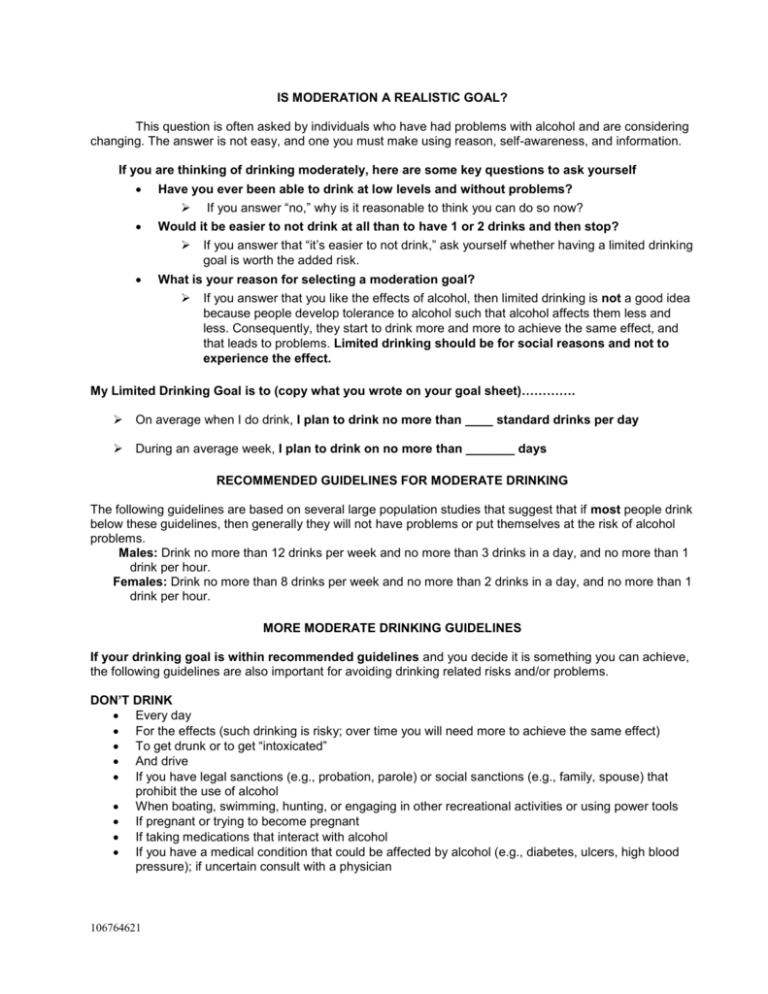
IS MODERATION A REALISTIC GOAL? This question is often asked by individuals who have had problems with alcohol and are considering changing. The answer is not easy, and one you must make using reason, self-awareness, and information. If you are thinking of drinking moderately, here are some key questions to ask yourself Have you ever been able to drink at low levels and without problems? Would it be easier to not drink at all than to have 1 or 2 drinks and then stop? If you answer “no,” why is it reasonable to think you can do so now? If you answer that “it’s easier to not drink,” ask yourself whether having a limited drinking goal is worth the added risk. What is your reason for selecting a moderation goal? If you answer that you like the effects of alcohol, then limited drinking is not a good idea because people develop tolerance to alcohol such that alcohol affects them less and less. Consequently, they start to drink more and more to achieve the same effect, and that leads to problems. Limited drinking should be for social reasons and not to experience the effect. My Limited Drinking Goal is to (copy what you wrote on your goal sheet)…………. On average when I do drink, I plan to drink no more than ____ standard drinks per day During an average week, I plan to drink on no more than _______ days RECOMMENDED GUIDELINES FOR MODERATE DRINKING The following guidelines are based on several large population studies that suggest that if most people drink below these guidelines, then generally they will not have problems or put themselves at the risk of alcohol problems. Males: Drink no more than 12 drinks per week and no more than 3 drinks in a day, and no more than 1 drink per hour. Females: Drink no more than 8 drinks per week and no more than 2 drinks in a day, and no more than 1 drink per hour. MORE MODERATE DRINKING GUIDELINES If your drinking goal is within recommended guidelines and you decide it is something you can achieve, the following guidelines are also important for avoiding drinking related risks and/or problems. DON’T DRINK Every day For the effects (such drinking is risky; over time you will need more to achieve the same effect) To get drunk or to get “intoxicated” And drive If you have legal sanctions (e.g., probation, parole) or social sanctions (e.g., family, spouse) that prohibit the use of alcohol When boating, swimming, hunting, or engaging in other recreational activities or using power tools If pregnant or trying to become pregnant If taking medications that interact with alcohol If you have a medical condition that could be affected by alcohol (e.g., diabetes, ulcers, high blood pressure); if uncertain consult with a physician 106764621 106764621 2 SUGGESTIONS FOR KEEPING YOUR DRINKING AT MODERATE LEVELS Have some abstinent days each week Drink slowly and make the drink last longer Pace your drinking—limit your drinking to 1 drink an hour Have non-alcoholic drinks between alcoholic drinks Choose beer and wine with lower alcohol content Identify people, places, or times that trigger your drinking Keep track of how much you drink by recording it. This will help you become more aware of how much you drink and your patterns. By monitoring you can see changes you’ve made Plan ahead! Decide when, where and how much you will drink; not drinking is an option Stop and Think! When you want to drink, stop and wait 20 minutes before deciding to have a drink; then ask yourself why you are having the drink and if it exceeds your goal SOME FINAL THOUGHTS If your goal is below the recommended guidelines and you are not putting yourself at risk of consequences if you drink, then moderation might be an appropriate goal. Remember If you try and it works, you take the credit! If you try and it doesn’t work, you can change your goal. While some people who have alcohol problems can return to moderate drinking, it’s not for everyone. When you select an abstinence goal, you only have to make one decision. If you decide to drink moderately you have to make a decision every time you take a drink. For some people it is easier to just make one decision and not drink. Like learning any new skill (e.g., playing tennis; cooking a new dish), learning how to drink moderately will require practice. It will also require conscious effort and focus for a time. You will be learning new habits and until it becomes routine you will have to be very focused and aware of what you are doing. Moderation is not for everyone and for many reasons it may be too difficult for some individuals now. If your goal exceeds the recommended guidelines or if there are ANY contraindications to drinking moderately, you are putting yourself at risk of consequences and should not drink moderately. REMEMBER DRINKING MORE THAN THE RECOMMENDED AMOUNTS OR DRINKING WHEN DRINKING IS CONTRAINDICATED IS NOT MODERATE DRINKING! Lastly, this document only contains suggestions and it cannot be expected to address everyone’s situation.
